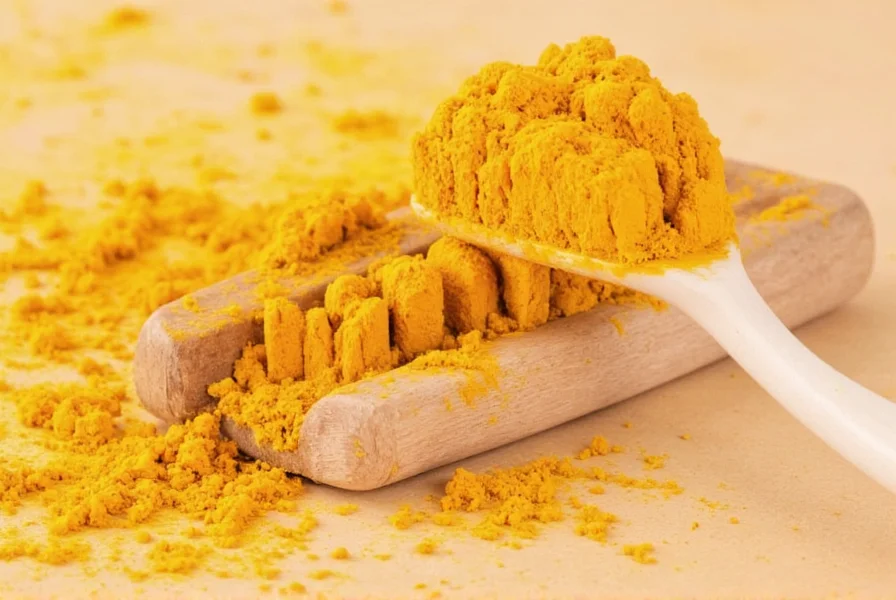Known for its golden hue and health benefits, turmeric has become a staple in kitchens and wellness routines worldwide. As its popularity grows, so do concerns about its effects on dental aesthetics. Let's examine the science behind turmeric's interaction with teeth and separate fact from fiction.
The Science Behind Turmeric Staining
Turmeric contains curcumin, a polyphenol responsible for its intense yellow-orange color. This same compound that gives turmeric its anti-inflammatory properties also makes it a natural dye. When consumed, curcumin can temporarily adhere to the pellicle layer—the thin protein film covering tooth enamel.
Unlike staining agents like tannins in coffee or red wine that penetrate microscopic pores in enamel, curcumin creates what dentists call extrinsic staining. These surface stains affect only the outermost layer and don't cause permanent discoloration when addressed promptly.

Turmeric vs. Common Staining Agents
| Substance | Stain Type | Penetration Depth | Removal Difficulty |
|---|---|---|---|
| Turmeric | Extrinsic (surface) | Superficial pellicle layer | Easy (daily brushing) |
| Coffee | Intrinsic + Extrinsic | Enamel pores | Moderate to difficult |
| Red Wine | Intrinsic + Extrinsic | Enamel pores | Moderate to difficult |
| Tobacco | Intrinsic + Extrinsic | Deep enamel penetration | Difficult (professional cleaning) |
Why Turmeric Staining Differs From Other Substances
Research published in the Journal of Indian Society of Periodontology reveals turmeric's unique dual nature. While its pigment can temporarily discolor teeth, curcumin also possesses antibacterial properties that may actually improve oral health. A 2019 study found turmeric mouthwash reduced plaque and gingivitis as effectively as chlorhexidine—but without the staining side effects common with that antiseptic.
The temporary nature of turmeric stains stems from its water-soluble properties. Unlike tannins that bind strongly to enamel proteins, curcumin washes away more readily. This explains why many traditional cultures use turmeric in oral care routines without reporting chronic staining issues.
Preventing Turmeric-Related Discoloration
You don't need to eliminate turmeric from your diet to protect your smile. Implement these practical strategies:
- Timing matters: Consume turmeric-containing foods or drinks with meals rather than alone. Food buffers the pigment's contact with teeth.
- Straw strategy: When drinking golden milk or turmeric lattes, use a straw to minimize contact with front teeth.
- Post-consumption rinse: Swish with water immediately after consuming turmeric products.
- Wait before brushing: Wait 30 minutes after eating/drinking to brush, as acids temporarily soften enamel.
- Baking soda boost: Add a pinch of baking soda to your toothpaste twice weekly—it neutralizes surface stains without abrasion.
The Whitening Paradox: Turmeric's Dual Dental Effects
Surprisingly, some research suggests turmeric may have mild whitening properties. A study in Nutrients journal noted that curcumin's antioxidant effects could potentially reduce oxidative stress on teeth. Traditional Ayurvedic practices have used turmeric paste for centuries as part of oral hygiene routines.
The key is moderation and proper technique. When used as a weekly toothpaste additive (mixed with coconut oil), turmeric's abrasive action combined with its natural coloring can create a polishing effect. However, daily use without proper removal may lead to temporary yellowing.
Removing Existing Turmeric Stains
If you notice temporary discoloration, try these safe removal methods:
- Mechanical removal: Brush gently with a soft-bristled toothbrush for two minutes. Most surface stains disappear with proper technique.
- Hydrogen peroxide rinse: Use a 1.5-3% solution as a mouthwash for 30-60 seconds after brushing (not daily).
- Activated charcoal: Once weekly, apply food-grade activated charcoal to teeth for 2 minutes before rinsing.
- Professional cleaning: If stains persist after 2 weeks of proper oral care, consult your dentist.
Avoid harsh scrubbing or overusing abrasive substances, which can damage enamel and make future staining more likely. Remember that persistent yellowing may indicate underlying issues unrelated to turmeric consumption.
Balancing Benefits and Aesthetics
Turmeric's health benefits—from reducing inflammation to supporting cognitive function—far outweigh the minor risk of temporary staining for most people. The American Dental Association confirms that surface stains from dietary sources like turmeric don't indicate enamel damage.
Consider these factors when evaluating your personal risk:
- Existing enamel condition (thinner enamel shows stains more readily)
- Frequency of consumption (daily golden milk vs. occasional curry)
- Current oral hygiene routine
- Other staining habits (coffee, tea, smoking)
For most people, incorporating turmeric into a balanced diet while maintaining good oral hygiene presents minimal aesthetic concerns. The temporary nature of any discoloration makes it a manageable trade-off for turmeric's significant health benefits.
Frequently Asked Questions
Does turmeric cause permanent teeth staining?
No, turmeric causes only temporary surface stains that wash away with regular brushing. Unlike coffee or tobacco stains that penetrate enamel, turmeric's water-soluble curcumin doesn't cause permanent discoloration when proper oral hygiene is maintained.
How quickly does turmeric stain teeth?
Visible discoloration typically appears within 30-60 minutes of consumption, especially with liquid forms like golden milk. The intensity depends on concentration and frequency of use, but regular brushing within 2 hours usually prevents noticeable staining.
Can turmeric actually whiten teeth?
Some evidence suggests turmeric may have mild whitening properties due to its antibacterial effects and gentle abrasive quality when used as a toothpaste additive. However, its yellow pigment can temporarily discolor teeth, creating a paradoxical effect that depends on usage frequency and removal technique.
Does turmeric stain dental veneers or crowns?
Porcelain veneers and crowns resist turmeric staining better than natural teeth due to their non-porous surface. However, composite restorations may show temporary surface discoloration similar to natural enamel. Regular professional cleanings maintain the appearance of all dental work.
How does turmeric compare to other natural remedies for teeth staining?
Turmeric causes less persistent staining than beetroot or red berries but more noticeable temporary discoloration than ginger. Unlike charcoal (which can be abrasive) or lemon (which erodes enamel), turmeric offers health benefits without damaging teeth when used properly.










 浙公网安备
33010002000092号
浙公网安备
33010002000092号 浙B2-20120091-4
浙B2-20120091-4